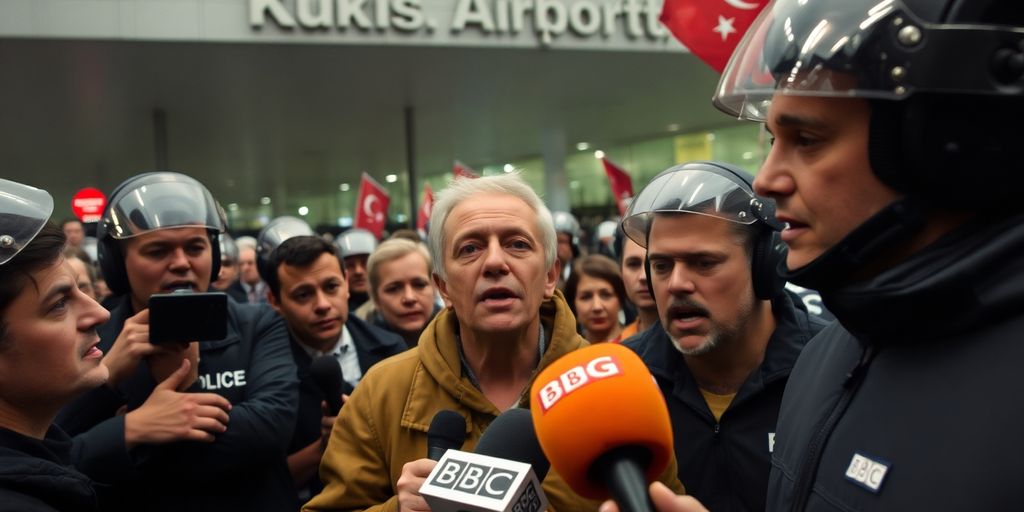A BBC reporter, Mark Lowen, was arrested and deported from Turkey after covering significant anti-government protests in Istanbul. His detention has raised concerns about press freedom in the country, particularly in light of the ongoing political unrest following the arrest of Istanbul’s mayor, Ekrem İmamoğlu.
Key Takeaways
- Mark Lowen was detained for 17 hours before being deported for allegedly being a "threat to public order."
- The protests were sparked by the arrest of Istanbul Mayor Ekrem İmamoğlu, a key opposition figure.
- Over 1,850 individuals have been detained during the protests, including several journalists.
- The incident highlights increasing government pressure on independent journalism in Turkey.
Background of the Protests
The protests erupted after the arrest of Ekrem İmamoğlu, who is seen as a major rival to President Recep Tayyip Erdoğan. İmamoğlu was detained on corruption charges, which he denies, and his supporters claim the charges are politically motivated. The protests have spread across Turkey, with demonstrators calling for democracy and justice.
Arrest and Deportation of Mark Lowen
Mark Lowen, a seasoned BBC correspondent with five years of experience living in Turkey, was taken from his hotel by Turkish authorities on March 26. He was held for 17 hours before being deported back to the UK. The Turkish government cited his deportation as a measure to maintain public order, a claim that has been met with skepticism by media and human rights organizations.
In a statement, Lowen expressed his distress over the incident, emphasizing the importance of press freedom and impartial reporting in a democracy. He stated, "To be detained and deported from the country where I previously lived for five years and for which I have such affection has been extremely distressing."
Reactions from the BBC and Human Rights Groups
The BBC condemned the deportation, with CEO Deborah Turness calling it an "extremely troubling incident." She affirmed the network’s commitment to impartial reporting in Turkey, stating that no journalist should face such treatment for doing their job.
Human rights advocates have also criticized the Turkish government’s actions. Emma Sinclair-Webb, Turkey director at Human Rights Watch, remarked that the deportation sends a clear message to international media about the risks of covering stories that the government wishes to suppress.
Broader Implications for Press Freedom in Turkey
Turkey has a notorious reputation for press freedom violations, ranking 158th out of 180 countries in the World Press Freedom Index. The recent events surrounding Lowen’s deportation and the arrests of other journalists signal a troubling trend of increasing repression against independent journalism in the country.
The Turkish government has been known to impose restrictions on media coverage, especially during times of political unrest. The recent protests have seen not only the detention of journalists but also the use of force against demonstrators, raising alarms about the state of civil liberties in Turkey.
Conclusion
The deportation of Mark Lowen underscores the precarious situation for journalists in Turkey, particularly those covering sensitive political issues. As protests continue and the government tightens its grip on media, the international community watches closely, advocating for the protection of press freedom and the rights of journalists in the country.
Sources
- Subscribe to read, Financial Times.
- BBC reporter arrested and deported from Turkey after covering protests | Turkey, The Guardian.
- BBC reporter Mark Lowen detained, deported while covering Turkey protests, upi.
- BBC reporter arrested and deported from Turkey, BBC.
- Turkey Deports BBC Reporter Who Covered Mass Protests, The New York Times.






